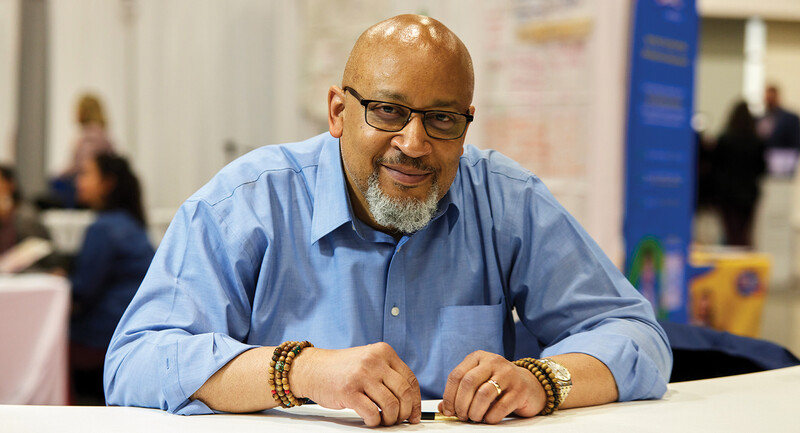October 1, 2023
•
•
Vol. 81•
No. 2De-Siloing Education Leadership
Leadership can be an isolating profession, but networks build connections.
It's lonely at the top. No doubt this phrase—referring to the isolation faced by individuals who find themselves in leadership roles—is a familiar one. As an education leader immersed in the "middle" years of my career, I have at times lacked collegial connection, a supportive learning environment, and a space to process my challenges with others. But I have learned that though we leaders may experience loneliness, we don't have to do this work alone.
My goal is to radically reframe the concept of individualistic, isolated leadership, which is all too common in our schools. Leaders cannot have the fullest impact possible on their schools without comprehensive support from mentors and coaches, networks of fellow leaders, and the greater education community. Education leaders also must face today's critical challenges—such as rising mental health concerns among staff and students and growing rates of educator attrition—as a collective entity. Until we recognize that we need to make necessary changes in our mindset and practice to better connect with each other, we will not stem the exodus of capable leaders—and our schools will suffer.
The success of leadership depends upon our communal strengths as leaders. Our school systems are governed by ratings and scores, which breed unfair competition on an uneven playing field (including between districts with disparate resources and among leaders facing different challenges across school sites).
In my earlier years, I naively believed that the success of the schools I led as a principal—which had ample funding and resources—was due to my leadership competence. I also would have told you I didn't need a network of support. The work rested squarely on my shoulders. To outwardly seek support might suggest I was ill-prepared. In reality, it was a precarious balancing act. I made weighty decisions by myself and internalized nagging anxiety that I might be wrong. Like others in the field, I felt intense pressure to "get it right" at the expense of my well-being (Bauer et al., 2019).
Then, when I was a secondary principal, my school's leadership team decided to overhaul our teacher evaluation framework because of student achievement concerns. I zeroed in on specific goals, but quickly realized how little experience I had in the work. I ended up leaning heavily on my former boss and mentor throughout that entire year. Without his patience and guidance, my vision would never have become a reality—and my original implementation plan would likely have harmed teachers. In countless other situations since then, I've seen how networks of colleagues from varied backgrounds, roles, and perspectives are vital for any leadership job.
Today, I work as a leadership coach with some extremely competent administrators in schools that face poverty, learning interruptions, and staggering staff shortages. I've seen leaders of such schools exit the profession at alarming rates, tired of facing malicious school boards and the competition of performance ratings. Nationwide, an estimated 16 percent of principals left their jobs in 2021–22—more than double the rate of the previous year, according to a 2023 report from the RAND Corporation.
It's unrealistic to think that leaders' connections can compensate for all the challenges our schools face. But if our goal as educators is to truly educate all students, school and district leaders must work toward supporting one another as best we can.
With communal leadership, people value the success of the greater group over individual success (Sparr et al., 2023). For example, bringing together the middle school principals I support for quarterly meetings reminds us that we are all striving toward the same goal of improving student outcomes. Whether serving as mentors, teaching leadership courses, or supporting public policy efforts to improve education conditions, we must build one another's capacity.
I've found leadership networks in many ways: by joining special-interest groups on social media, such as Twitter chats on standards-based grading or Facebook groups for principals; participating in career-coaching cohorts and book studies; and engaging in professional learning events (including ASCD special interest groups). These colleagues have collaborated with me as thought partners and offered inspiration when my limits were tested. I learned new processes for handling difficult conversations, coaching teachers, and overcoming emotional challenges. They have nurtured my professional growth, sustained my well-being, and offered friendships rooted in a common passion: creating spaces for young people to be safe, happy, and resilient.
The more time I spent in leadership, the more I saw the role others played in my success. Now, as I coach other leaders, I see the power of developing our growth together. An African philosophy known as Ubuntu reflects my belief about leadership for the betterment of collective community, defined by "synergy, cultivating relationships of trust … [and] contributing collectively at work, not because it is required but because one recognizes the power of unity" (Eaton Business School, 2023).
I've endeavored to be the web of support as a network member. I intentionally partner with new leaders on writing projects or make connections between colleagues, which may reveal career or mentoring opportunities for them. Within your education community, think about what resources you might make more accessible to others or what skills you possess that others may aspire to develop. One mentor in my district, for example, carved out time for us to discuss issues small and large. By prioritizing my needs, she emboldened me to tackle the challenges I faced.
When we distribute knowledge about effective leadership practices, we cultivate empowered leaders who move the education community forward. Consider the newer leaders in your community, and ask yourself, what is one action you could take that would contribute to their success? Could you promote their accomplishments on social media or introduce them to someone with expertise in an area in which they are growing?
The education community must shift away from expecting leaders to operate in silos with no structural support and toward communal leadership in which we are all responsible for one another's successes. No matter how seemingly insignificant our actions, we as leaders must each use our unique experience to create more effective leadership pathways and spaces where all may thrive.
References
•
Bauer, S., Silver, L., & Schwartzer, J. (2019). The impact of isolation on new principals' persistence. Educational Management Administration & Leadership, 47(3), 383–399.
•
Eaton Business School. (2023). Embodying the African spirit of Ubuntu at work. EBSolute Blogs.
•
Sparr, J. L., Waldman, D. A., & Kearney, E. (2023). Paradoxes in agentic and communal leadership. In D. Schedlitzki, M. Larsson, B. Carrol, M. C. Blight, & O. Eritropaki (Eds.), The SAGE handbook of leadership, 2nd ed. (pp. 472–783). SAGE Publications.









